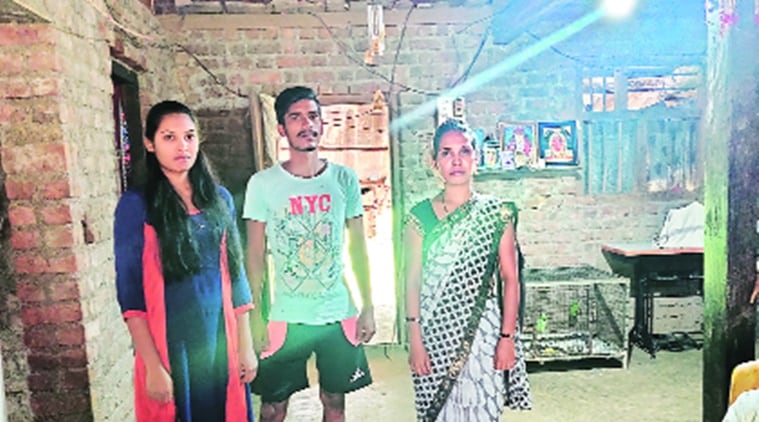 Three siblings in Papde family have sickle cell disorder. Photo by ( Tabassum Barnagarwala)
Three siblings in Papde family have sickle cell disorder. Photo by ( Tabassum Barnagarwala)
Since the past fortnight, Ankush Jadhav (38), a resident of Tamsai village in Palghar, has been suffering from acute joint pain, common for all sickle cell patients once the weather gets chilly. The crisis this time, however, is far more severe as since April Jadhav has not received free folic acid dose – essential to renew Red Blood Cell (RBC) count – that the state government provides to sickle cell patients.
After Ganesh, his younger brother who was also a sickle cell patient, died in May due to lack of healthcare, Ankush knows he is staring at a bleak future. Hundreds of patients in the tribal-dominated areas of the state are facing a health care crisis as sickle cell diagnosis and treatment has come to a standstill in 21 high-burden districts in Maharashtra due to the Covid-19 outbreak. “If something happens to me, who will look after both our families?” he says. Ganesh, an auto rickshaw driver, had abdomen and joint pain for days. On May 1 at 2 am, he passed away at home.
Two factors have hit sickle cell services in the state, which accounts for over 30,000 patients: the Covid-19 pandemic and an April 20 government resolution (GR) announcing NGOs working on the sickle cell since a decade would no longer continue the work, instead Accredited Social Health Activists (ASHAs) would take over these patients.
Since April, NGOs in seven districts, including Palghar, have stopped functioning. They have diverted all calls to ASHAs, who are over-burdened with the ongoing Covid-19 survey, and have received no training to handle sickle cell patients.
“An ASHA used to come to our house. I told her our folic acid stock is over and we need help with sickle cell. But she said she doesn’t know anything. She only asked about cough, cold and fever and left,” said Ankush, a daily wager, who has had no source of employment since March. The family depends on free ration supplied by the government. “Sometimes we eat rice and sleep.”
Palghar has 611 sickle cell patients and over 6,200 carriers of the disease — a genetic blood disorder that reduces RBC count and causes clotting in joints. A patient can suffer a stroke, acute chest syndrome, but most patients, like Ganesh, die suddenly and unexpectedly.
ASHA Manisha Bhoir said, “We have not been told by the district office to do any sickle cell services. No training has been given.” Her sister-in-law Mansi Bhoir also suffers from sickle cell. Mansi goes to a private clinic to buy folic acid stock since the government stopped supplying them at home.
But not everyone in the tribal areas can afford to purchase the medicine which costs around Rs 65 per strip. In Tamsai village, a few kilometres away, three siblings – Pranita Papde (19), Dinesh Papde (17) and Vasula Chimbate (30) – are also suffering from the disease. “We buy one strip for Rs 65 and need three such strips each month. My father is a labourer. There is no work. We buy medicine from our savings,” Pranita said.
A doctor at Maswan primary health centre (PHC) said they have a stock of folic acid but no patient has come to take it since April. “Our outreach services are hit because of Covid-19. And patients are scared to visit health centres,” he said. Since the last four months, the PHC has conducted no solubility tests, a test to diagnose new sickle cell patients.
A shortage of kits also remains a problem in diagnosing new patients. Palghar alone requires 20,000 kits a year.
The state government data shows only 53,000 tests have been conducted in the last three month in seven districts, all through NGOs’ support. Dr Mahendra Kendre, in-charge of sickle cell in Directorate of Health Services, said, “We are trying to restart sickle cell services. Orders for solubility kits have been placed with Haffkine Institute and districts have been given money for local purchase.”
Kendre said the NGO cost was high and the state had therefore decided to stop their services. With NGOs gone, the state needs manpower to run the sickle cell programme. DHS has sent a proposal to have one counsellor for two talukas in seven districts where NGOs earlier functioned.
Roshni Patil, from NGO Navoday Gramin Sanstha that managed Palghar patients, said, “We keep getting calls from patients for medicine. Sometimes they are in acute pain. But I cannot do anything anymore. I only refer them to the hospital. The state government should have made alternate arrangements before they terminated all NGOs.”